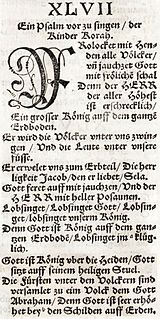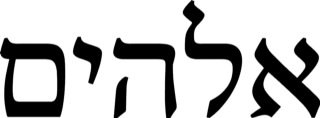The name of God most often used in the Hebrew Bible is the Tetragrammaton. It is frequently anglicized as Yahweh or Jehovah and written in most English editions of the Bible as "the LORD" owing to the Jewish tradition increasingly viewing the divine name as too sacred to be uttered. It was thus replaced vocally in the synagogue ritual by the Hebrew word Adonai, which was translated as Kyrios (“Lord”) in the Septuagint, the Greek version of the Hebrew scriptures.

Yahweh was the national god of the Iron Age kingdoms of Israel (Samaria) and Judah. His exact origins are disputed, although they reach back to the early Iron Age and even the Late Bronze: his name may have begun as an epithet of El, head of the Bronze Age Canaanite pantheon, but the earliest plausible mentions of Yahweh are in Egyptian texts that refer to a similar-sounding place name associated with the Shasu nomads of the southern Transjordan. Some scholars believe that Yahweh was originally thought to be one of the seventy sons of El, who later killed his siblings and displaced his father El at the head of the Israelite pantheon.
Jah or Yah is a short form, the first syllable, of Yahweh, the proper name of God in the Hebrew Bible. This short form of the name occurs 50 times in the text of the Hebrew Bible, of which 24 form part of the phrase "Hallelujah", which is actually a two-word phrase, not one word.

Shema Yisrael is a Jewish prayer, and is also the first two words of a section of the Torah, and is the title of a prayer that serves as a centerpiece of the morning and evening Jewish prayer services. The first verse encapsulates the monotheistic essence of Judaism: "Hear, O Israel: the LORD our God, the LORD is one", found in Deuteronomy 6:4. Observant Jews consider the Shema to be the most important part of the prayer service in Judaism, and its twice-daily recitation as a mitzvah. Also, it is traditional for Jews to say the Shema as their last words, and for parents to teach their children to say it before they go to sleep at night.

There are various names of God, many of which enumerate the various qualities of a Supreme Being. The English word "God" is used by multiple religions as a noun or name to refer to different deities, or specifically to the Supreme Being, as denoted in English by the capitalized and uncapitalized terms "God" and "god". Ancient cognate equivalents for the biblical Hebrew Elohim, one of the most common names of God in the Bible, include proto-Semitic El, biblical Aramaic Elah, and Arabic 'ilah. The personal or proper name for God in many of these languages may either be distinguished from such attributes, or homonymic. For example, in Judaism the tetragrammaton is sometimes related to the ancient Hebrew ehyeh. In the Hebrew Bible, the personal name of God is revealed directly to Moses, namely: "Yahweh".
Hallelujah is an English interjection. It is a transliteration of the Hebrew phrase הַלְלוּ יָהּ, which is composed of two elements: הַלְלוּ and יָהּ.
The Parvardigar Prayer is the common name of a prayer composed by Meher Baba. It was originally called the Master's Prayer or the Universal Prayer. Meher Baba composed the prayer in Dehradun, India, in August 1953 and made it public on September 13, 1953. Near the end of January 1968 Meher Baba dictated a circular to his followers to recite the Parvardigar Prayer and the Prayer of Repentance each day until March 25, 1968. On February 21 of that year he issued a second circular requesting that the prayers be continued until May 21, 1968. The order ended on that date.

Jehovah is a Latinization of the Hebrew יְהֹוָה, one vocalization of the Tetragrammaton יהוה (YHWH), the proper name of the God of Israel in the Hebrew Bible and one of the seven names of God in Judaism.
Judaism, Christianity, and Islam are sometimes called Abrahamic religions because they all accept the tradition of the God that revealed himself to the prophet Abraham. The theological traditions of all Abrahamic religions are thus to some extent influenced by the depiction of the God of Israel in the Hebrew Bible, and the historical development of monotheism in the history of Judaism.
El Shaddai or just Shaddai is one of the names of the God of Israel. El Shaddai is conventionally translated as God Almighty but the construction of the phrase fits the pattern of the divine appellations in the Ancient Near East and as such can convey various types of semantic relations between these two words: El of a place known as Shaddai, El possessing the quality of shaddai, or El who is also known as Shaddai – exactly as is the case with the names like "’El Olam", "’El Elyon" or "’El Betel". Moreover, while the translation of El as "God" or "Lord" in the Ugaritic/Canaanite language is straightforward, the literal meaning of Shaddai is the subject of debate. The name appears 48 times in the Bible, seven times as "El Shaddai".
"El Shaddai" is a contemporary Christian music song. It was written by Michael Card and John Thompson, using direct quotes from scripture as their inspiration, and recorded by Michael Card on his 1981 debut album, Legacy. However, it is more commonly associated with the singer Amy Grant, who recorded it on her 1982 platinum album Age to Age.
In the Book of Genesis, Jehovah-jireh or Yahweh Yireh was a place in the land of Moriah. It was the location of the binding of Isaac, where God told Abraham to offer his son Isaac as a burnt offering. Abraham named the place after God provided a ram to sacrifice in place of Isaac. The phrase continues to be used among Christians.
"And Abraham called the name of that place Jehovahjireh: as it is said to this day, In the mount of the Lord it shall be seen." – Genesis 22:14 (KJV)

The Tetragrammaton, יהוה in Hebrew, is the four-letter biblical name of the God of Israel. While there is no consensus about the structure and etymology of the name, "the form yahweh is now accepted almost universally".
Gender in Bible translation concerns various issues, such as the gender of God and generic antecedents in reference to people. Many in today’s churches have become conscious of and concerned about sexism. Bruce Metzger states the English language is so biased towards the male gender that it may restrict and obscure meaning from original languages. The New Revised Standard Version (NRSV) was one of the first major translations to adopt gender-neutral language. The King James Version translated at least one passage using a technique that many now reject in other translations, "Blessed are the peacemakers, for they shall be called the children of God". The Greek word υἱοὶ that appears in the original is usually translated as "sons", but in this passage the translators chose to use the term "children" that included both genders. Opponents of gender neutral language believe that readers who are not familiar with the original languages, can be influenced by a compromised meaning they believe is feminist.

Sacred Name Bibles are Bible translations that consistently use Hebraic forms of God's personal name, instead of its English language translation, in both the Old and New Testaments. Some Bible versions, such as the Jerusalem Bible, employ the name Yahweh, a transliteration of Hebrew YHWH, in the English text of the Old Testament, where traditional English versions have LORD.

In Christian theology the name of God has always had much deeper meaning and significance than being just a label or designator. Christian belief states that the name of God is not a human invention, but has divine origin and is based on divine revelation. Respect for the name of God is one of the Ten Commandments, which some Christian teachings interpret to be not only a command to avoid the improper use God's name, but a directive to exalt it through both pious deeds and praise. This is reflected in the first petition in the Lord's Prayer addressed to God the Father: "Hallowed be Thy Name".
An Adonaist is a sect or party who maintain that the Hebrew language vowel points ordinarily annexed to the consonants of the word "Jehovah", are not the natural points belonging to that word, and that they do not express the true pronunciation of it; but that they are vowel points belonging to the words, Adonai and Elohim, applied to the ineffable name Jehovah, which the Jews were forbidden to utter, and the true pronunciation of which was lost; they were therefore always to pronounce the word Adonai, instead of Jehovah.
Psalm 12 is the 12th psalm from the Book of Psalms. It is a Psalm of lament, internally cited as being a psalm of David.

Psalm 47 is the 47th psalm of the Book of Psalms, generally known in English by its first verse, in the King James Version, "O clap your hands". The Book of Psalms is the third section of the Hebrew Bible, and a book of the Christian Old Testament. In the Greek Septuagint version of the bible, and in its Latin translation in the Vulgate, this psalm is Psalm 46 in a slightly different numbering system. In Latin, it is known as "Omnes gentes plaudite manibus". The psalm is a hymn psalm. It is one of twelve psalms attributed to the sons of Korah, and one of fifty-five psalms addressed to the "Chief Musician" or "Conductor".
I am that I am is a common English translation of the Hebrew phrase אֶהְיֶה אֲשֶׁר אֶהְיֶה, ’ehyeh ’ăšer ’ehyeh – also "I am who I am", "I am what I am" or "I will be what I will be" or even "I create what(ever) I create". The traditional English translation within Judaism favors "I will be what I will be" because there is no present tense of the verb "to be" in the Hebrew language. So for example to say "I am a sailor" in Hebrew would be Ani Malakh.













